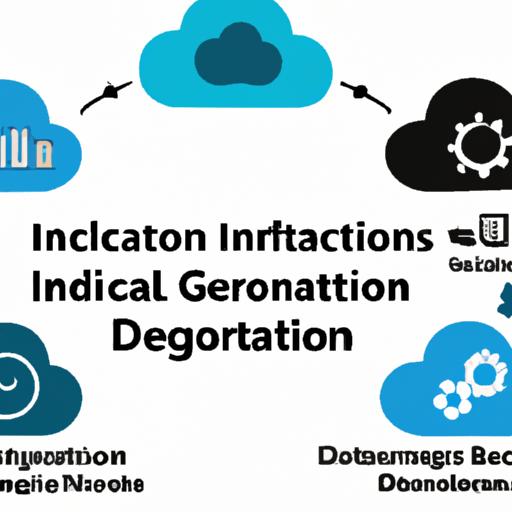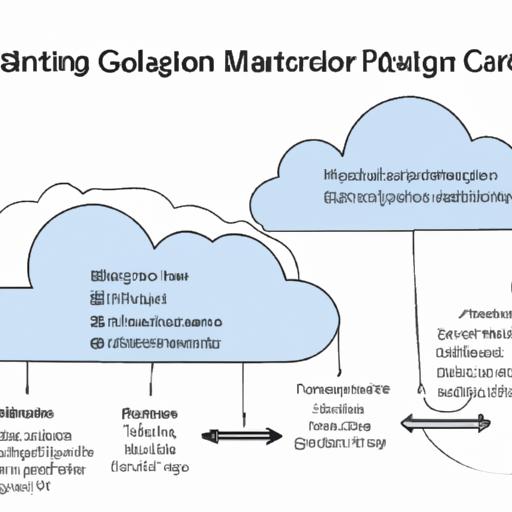Cloud data integration services have become an indispensable tool for businesses in today’s data-driven world. With the exponential growth of data and the increasing need for seamless integration, finding the right cloud data integration service is crucial. In this article, I will provide you with a comprehensive review of the top cloud data integration services available, helping you make an informed decision that aligns with your business needs.
Introduction: Embracing the Power of Cloud Data Integration Services

Cloud data integration services refer to the processes and tools used to combine data from various sources, formats, and applications, enabling businesses to streamline their operations and gain valuable insights. These services play a pivotal role in ensuring data is accurate, accessible, and actionable, empowering organizations to make informed decisions and drive growth.
In today’s competitive landscape, businesses are generating massive amounts of data from diverse sources such as social media platforms, customer relationship management (CRM) systems, enterprise resource planning (ERP) systems, and more. However, harnessing the true potential of this data can be challenging without proper integration. Here’s where cloud data integration services come into play.
By seamlessly connecting disparate data sources, cloud data integration services break down silos and provide a unified view of your organization’s data. This integration enables data to flow freely across systems, ensuring consistency and eliminating data duplication. Moreover, it allows for real-time data synchronization, providing up-to-date insights for timely decision-making.
In this article, I will delve into the top cloud data integration services available in the market, analyzing their features, benefits, and pricing models. Whether you are a small business looking for a cost-effective solution or an enterprise in need of robust integration capabilities, this review will help you find the perfect fit for your unique requirements.
Stay tuned for the next sections where we will explore the factors to consider when choosing cloud data integration services and dive into the detailed reviews of the top contenders in the market. Are you ready to revolutionize your data integration process? Let’s embark on this journey together!
Understanding Cloud Data Integration Services

What are Cloud Data Integration Services?
Cloud data integration services refer to the tools and processes used to connect and consolidate data from various sources into a unified platform hosted in the cloud. These services enable organizations to seamlessly integrate and manage their data, regardless of the source or format. By leveraging cloud-based technologies, businesses can overcome the challenges associated with traditional on-premises data integration methods.
Cloud data integration services offer a robust and scalable solution for handling large volumes of data, ensuring its accuracy, accessibility, and reliability. These services employ advanced data integration techniques, including extract, transform, and load (ETL) processes, data replication, data synchronization, and data cleansing. Through these processes, organizations can achieve efficient data consolidation, synchronization, and transformation, leading to improved data quality and decision-making capabilities.
Benefits of Using Cloud Data Integration Services
Implementing cloud data integration services provides numerous benefits for organizations, including:
-
Seamless Integration: Cloud data integration services enable the smooth integration of data from disparate sources, such as databases, applications, and APIs. This integration eliminates data silos and ensures a unified view of information, enabling organizations to make data-driven decisions.
-
Scalability and Flexibility: Cloud-based solutions offer scalability and flexibility, allowing businesses to easily accommodate growing data volumes and changing business needs. These services can handle large-scale data integration tasks, ensuring your organization can adapt and grow without limitations.
-
Real-Time Data Synchronization: Cloud data integration services facilitate real-time data synchronization, ensuring that data across different systems is always up-to-date. This real-time synchronization enables organizations to access the most current information for accurate analysis and decision-making.
Types of Cloud Data Integration Services
The market offers various types of cloud data integration services to cater to different business requirements. Some common types include:
-
ETL (Extract, Transform, Load) Services: ETL services involve extracting data from multiple sources, transforming it to meet specific requirements, and loading it into a target system or data warehouse. These services are ideal for organizations that require complex data transformations and large-scale batch processing.
-
Data Replication Services: Data replication services focus on duplicating and synchronizing data across different systems and databases. These services are particularly useful when organizations need to maintain data consistency and availability across multiple locations or databases.
-
Data Virtualization Services: Data virtualization services create a virtual layer that allows organizations to access and integrate data from various sources without physically moving or replicating it. This approach provides real-time access to data without the need for extensive data movement or storage.
Understanding these different types of cloud data integration services will help you identify the most suitable solution for your organization’s specific needs. In the next section, we will explore the essential factors to consider when choosing a cloud data integration service.
Factors to Consider When Choosing Cloud Data Integration Services

When it comes to choosing the right cloud data integration service, there are several key factors you need to consider. Let’s explore these factors in detail to ensure you make an informed decision that aligns with your business needs.
Reliability and Scalability
Reliability is paramount when selecting a cloud data integration service. You need a service that can handle your data integration requirements consistently and efficiently. Look for providers that offer high uptime guarantees and have a proven track record of reliability. Additionally, scalability is crucial to accommodate your growing data volumes and future expansion. Ensure the service can scale seamlessly to meet your evolving needs.
Integration Capabilities
One of the primary reasons for opting for a cloud data integration service is to streamline the integration of data from various sources and formats. Consider the integration capabilities of the service, ensuring it supports the data sources and formats relevant to your business. Whether you need to integrate data from databases, APIs, spreadsheets, or cloud applications, the service should offer robust integration capabilities to handle your specific requirements.
Security Measures and Data Privacy Policies
Data security is of utmost importance when dealing with sensitive business information. Evaluate the security measures implemented by the cloud data integration service provider. Look for features like encryption, access controls, and compliance with industry standards such as GDPR or HIPAA, depending on your specific needs. Additionally, review the provider’s data privacy policies to ensure they align with your organization’s data protection requirements.
User-Friendly Interface and Ease of Use
A user-friendly interface is essential to maximize the usability and efficiency of the cloud data integration service. Consider the ease of use and intuitiveness of the platform. Look for features like drag-and-drop functionality, visual mapping tools, and intuitive workflows that make it easy for both technical and non-technical users to navigate and operate the service effectively.
Cost-Effectiveness and Pricing Models
Cost-effectiveness is a crucial factor for any business. Evaluate the pricing models offered by different cloud data integration service providers. Consider factors such as subscription fees, data volume pricing, and additional costs for integrations or support. Choose a service that fits within your budget while providing the necessary features and scalability.
By considering these factors when selecting a cloud data integration service, you can ensure that you choose a reliable, secure, and user-friendly solution that meets your organization’s integration needs. Now, let’s move on to the next section, where I will review the top cloud data integration services available in the market.
Review of Top Cloud Data Integration Services
Now, let’s dive into the detailed review of the top cloud data integration services available in the market. Each service offers unique features and benefits that cater to different business needs. Let’s explore them one by one:
Service 1: Overview, Features, and Benefits
Service 1 is a robust cloud data integration solution that excels in its seamless connectivity and scalability. With a user-friendly interface, it allows you to effortlessly integrate data from various sources and formats. Its advanced features include real-time data synchronization, data validation, and error handling mechanisms. Additionally, it offers exceptional security measures to ensure the confidentiality and integrity of your data. Service 1’s competitive pricing model makes it an attractive option for small to medium-sized businesses.
Service 2: Overview, Features, and Benefits
Service 2 stands out for its comprehensive integration capabilities and extensive library of connectors. It supports a wide range of data sources, including cloud-based applications, databases, and file formats. Its intuitive drag-and-drop interface simplifies the integration process, making it accessible to users with varying technical expertise. Service 2’s powerful transformation and mapping features enable you to derive valuable insights from your integrated data. Furthermore, its flexible pricing options make it suitable for businesses of all sizes.
Service 3: Overview, Features, and Benefits
Service 3 offers a highly scalable and reliable cloud data integration solution. It boasts advanced data governance features, ensuring data quality and compliance with regulatory standards. Its intelligent data mapping capabilities automatically match fields across different systems, saving time and effort. Service 3’s extensive data transformation capabilities allow you to cleanse and enrich your data before integration, improving its accuracy and usefulness. With its competitive pricing structure, Service 3 is a preferred choice for enterprises requiring robust integration capabilities.
Service 4: Overview, Features, and Benefits
Service 4 provides a comprehensive cloud data integration platform that caters to businesses of all sizes. Its intuitive visual interface allows for seamless data mapping and transformation, making the integration process efficient and effortless. Service 4 excels in its ability to handle large volumes of data, ensuring quick and reliable integration. Its real-time monitoring and alerting features provide valuable insights into the integration process, allowing for proactive troubleshooting. With its flexible pricing options, Service 4 offers an excellent value proposition for businesses seeking a reliable data integration solution.
Service 5: Overview, Features, and Benefits
Service 5 offers a cutting-edge cloud data integration service with a focus on data security and privacy. It utilizes robust encryption techniques to safeguard your data during transit and at rest. Service 5’s extensive range of connectors enables seamless integration with various data sources and applications. Its powerful data transformation capabilities allow for complex data manipulation and enrichment. With its competitive pricing model, Service 5 is a reliable choice for businesses that prioritize data protection and require a flexible integration solution.
Stay tuned for the next section, where we will compare and analyze the reviewed cloud data integration services based on various factors. Let’s find the perfect fit for your business needs!
Comparison and Analysis of the Reviewed Services
Evaluating Based on Key Factors
To provide you with a comprehensive understanding of the top cloud data integration services, let’s evaluate each service based on the factors mentioned in Section Reliability and scalability are crucial aspects to consider when choosing a service. We will examine how each service performs in terms of handling large volumes of data and ensuring consistent performance.
Integration capabilities are another key factor. We will assess how effectively each service integrates with different data sources and formats, ensuring seamless connectivity across your entire data ecosystem. Additionally, we will explore the security measures and data privacy policies of each service to ensure your data remains protected.
User-friendliness and ease of use are essential to maximize productivity. We will delve into the user interfaces of the reviewed services, analyzing their intuitiveness and simplicity. Moreover, we will consider the overall cost-effectiveness of each service, examining their pricing models and determining their value for money.
Comparing Pricing Models and Value for Money
In this section, we will compare the pricing models of the reviewed cloud data integration services. Each service may offer various pricing tiers based on factors such as data volume, number of connections, and additional features. We will analyze the cost-effectiveness of each pricing model, considering the scalability and flexibility it provides.
Value for money is a vital aspect when investing in any service. We will assess the pricing in relation to the features and benefits offered by each service. It’s crucial to find a balance between cost and functionality to ensure you are getting the most out of your investment.
User Feedback and Customer Reviews
To gain insights into the real-world experiences of users, we will explore user feedback and customer reviews for each of the reviewed services. Examining the experiences and opinions of current customers will help us gauge the overall satisfaction levels and identify any potential shortcomings or advantages.
By analyzing user feedback and customer reviews, we can gain valuable insights into the usability, performance, and support offered by each service. This will allow you to make an informed decision based on the experiences of others who have already implemented these cloud data integration services.
Stay tuned for the next section where we will conclude our comprehensive review and provide recommendations based on your specific requirements. Let’s uncover the best cloud data integration service that aligns perfectly with your business needs!



